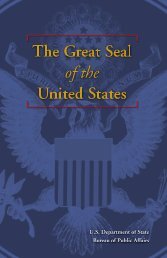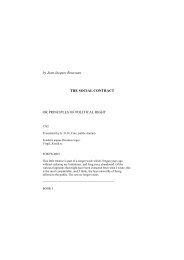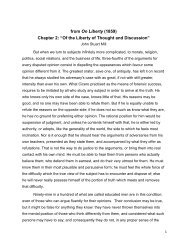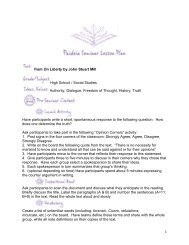Pericles
From the “Funeral Oration” by Pericles As recorded by Thucydides in the History of the Peloponnesian War
From the “Funeral Oration” by Pericles
As recorded by Thucydides in the History of the Peloponnesian War
You also want an ePaper? Increase the reach of your titles
YUMPU automatically turns print PDFs into web optimized ePapers that Google loves.
From the “Funeral Oration” by <strong>Pericles</strong><br />
As recorded by Thucydides in the History of the Peloponnesian War<br />
For our system of government does not copy the systems of our neighbors: we are<br />
a model to them, not they to us. Our constitution is called a democracy, because power<br />
rests in the hands not of the few but of the many. Our laws guarantee equal justice for all<br />
in their private disputes; and as for the election of public officials, we welcome talent to<br />
every arena of achievement, nor do we make our choices on the ground of class but on<br />
the grounds of excellence alone. And as we give free play to all in our public life, so we<br />
carry the same spirit into our daily relations with one another. We have no black looks or<br />
angry words for our neighbor if he enjoys himself in his own way, and we even abstain<br />
from little acts of churlishness that, though they do no mortal damage, leave hurt feelings<br />
in their wake. Open and tolerant in our private lives, in our public affairs we keep within<br />
the law. We acknowledge the restraint of reverence; we are obedient to those in authority<br />
and to the laws, especially to those that give protection to the oppressed and those<br />
unwritten laws of the heart whose transgression brings admitted shame. . . .<br />
We are lovers of beauty without extravagance, and lovers of wisdom without<br />
effeminacy. Wealth to us is not mere material for vainglory but an opportunity for<br />
achievement; and we think poverty nothing to be ashamed of unless one makes no effort<br />
to overcome it. Our citizens attend both to public and private duties and do not allow<br />
absorption in their own affairs to diminish their knowledge of the City’s business. We<br />
differ from other states in regarding the man who keeps aloof from public life not as<br />
“private” but as useless; we decide or debate, carefully and in person all matters of<br />
policy, and we hold, not that words and deeds go ill together, but that acts are
foredoomed to failure when undertaken undiscussed. For we are noted for being at once<br />
most adventurous in action and most reflective beforehand. Other men are bold in<br />
ignorance, while reflection will stop their going forward. But the bravest are surely those<br />
who have the clearest vision of what lies before them, glory and danger alike—and yet go<br />
forth to meet it.<br />
In doing good, too we are the exact opposite of the rest of mankind. We secure<br />
our friends not by accepting favors but by granting them. And so this makes friendship<br />
with us something that can be counted on: for we are eager, as creditors, to cement by<br />
continued kindness our relation to our friends. If they do not respond with the same<br />
warmth, it is because they feel that their services will not be given spontaneously but only<br />
as repayment of a debt. We are alone among mankind in doing men benefits, not on<br />
calculation of self-interest, but in the fearless confidence of freedom. . . .<br />
Such an end as we have here seems indeed to show us what a good life is, from its<br />
first signs of power to its final consummation.











